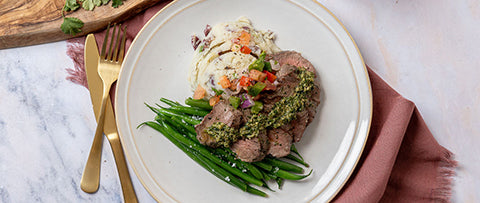Flavor pairing is a culinary technique that transforms ordinary meals into extraordinary experiences. By combining complementary ingredients, you can create mouthwatering dishes that tantalize your taste buds and nourish your body. This art form is one of the key reasons why fit-flavors customers keep coming back. They love the variety on our ever-changing menu, which keeps their palates excited and their bodies well-nourished. Let’s dive into the principles of flavor pairing and discover how you can create culinary heaven at home.
Flavor pairing involves combining ingredients that enhance each other's flavors, creating a harmonious and balanced dish. It’s about understanding the interaction between different tastes, textures, and aromas to create a meal that is greater than the sum of its parts.
At fit-flavors, we like to start with complementary flavors. Complementary flavors are those that balance each other out. For example, the sweetness of honey can mellow the acidity of lemon, while the richness of avocado can balance the spiciness of jalapeño. Pairing complementary flavors ensures that no single taste overpowers the others, creating a well-rounded dish.
Contrasting flavors is another fun way to add excitement and complexity to a dish. Think of the classic combination of sweet and salty, like salted caramel. The contrast enhances the individual flavors and keeps your palate engaged.
Texture and aroma can also play crucial roles in flavor pairing. A dish with varied textures is more interesting and satisfying to eat. Similarly, the aroma can enhance the flavor experience, as our sense of smell significantly contributes to our perception of taste.
Are you ready to master flavor pairing? Here are 3 key principles of flavor pairing:
1. Balance
Balance is essential in flavor pairing. It’s about finding the right proportions of flavors to create harmony. For example, pairing a rich, fatty protein like salmon with a tangy, acidic sauce like a citrus vinaigrette can balance the heaviness of the fish with a refreshing zest.
2. Contrast
As mentioned, contrasting flavors add excitement. A crunchy element like nuts or seeds can contrast with creamy ingredients like yogurt or cheese, adding both flavor and texture contrast.
3. Seasonality
Using seasonal ingredients enhances the flavor and nutritional value of your dishes. Seasonal produce is fresher, more flavorful, and packed with nutrients. fit-flavors frequently changes its menu to incorporate seasonal ingredients, ensuring that our dishes are always fresh and exciting.
Ready to put it to practice in your kitchen? Here are 4 tips for mastering flavor pairing at home.
1. Start with Familiar Combinations
Begin with well-known flavor pairings like tomato and basil, peanut butter and chocolate, or apple and cinnamon. These combinations are popular for a reason – they work!
2. Experiment with New Ingredients
Don’t be afraid to try new ingredients and combinations. Exploring different cuisines can introduce you to unique flavor pairings that you might not have considered.
3. Use Fresh Herbs and Spices
Fresh herbs and spices can elevate the flavor of any dish. Experiment with different herbs like cilantro, rosemary, and thyme, and spices like cumin, coriander, and paprika.
4. Pay Attention to Texture
Combine ingredients with varying textures to add interest to your dishes. Pairing crunchy vegetables with creamy dressings or sauces can enhance the overall eating experience.
The art of flavor pairing is about more than just creating delicious meals – it’s about crafting an experience that delights the senses and nourishes the body. At fit-flavors, we pride ourselves on our ability to pair ingredients in innovative ways, offering a menu that is as diverse as it is delicious. By understanding and applying the principles of flavor pairing, you can create culinary masterpieces at home that will keep you and your loved ones coming back for more. Embrace the art of flavor pairing and transform your everyday meals into extraordinary dining experiences.






